18″ radomes #3, weirdness edition
I’m beginning to feel a bit different. Who else was pleased to see the fog roll back into Camden yesterday? And what other boat has four 18″ radomes mounted, one with velcro…
When I realized that Raymarine’s latest radome technology is quite competitive with the new Broadband Radar, and that both seemed significantly better than older 18″ radars, I decided to check out the latest from Garmin and Furuno. Which is why the BR24 is now mounted on the front of Gizmo’s flying bridge, and her mast features the weirdness below. This shot does illustrate their relative size/shape differences, as well as a variety of ways to cable power and Ethernet in an easy to install manner, which I’ll detail in a future entry. I’m also working on ways to present the huge collection of comparative screenshots and photos I’m gathering.
I can tell you now that all these little domes are pretty darn good. While the Garmin GMR 18 HD still has the least resolution at very close ranges, it’s noticeably better than when I saw it onboard a friend’s boat last summer. Garmin changed the way it presents MARPA targets, too, along with a slew of other 5.0 improvements. And while I only have a couple of hours with the Furuno DRSD2, it may well be the best of the lot, even though the other two maggies are 4 kW and it’s only 2.2. Its scanner may be the smallest too, as UHD 19″ refers to the casing size; the actual array is only 16.75″ wide, and the claimed horizontal beam width is 5.2�, the biggest by a hair. But one major lesson of this whole exercise is that power and beam width are less important performance factors than they used to be.
Getting back to the weirdness, note the egg taped to back side of the Ray RD418D. This was the idea of my friend and colleague Arnie Hammerman (an imaginative guy). We were discussing the minor controversy over Broadband’s safety claims, and Arnie brought up the claim (myth?) that large radars can boil eggs…
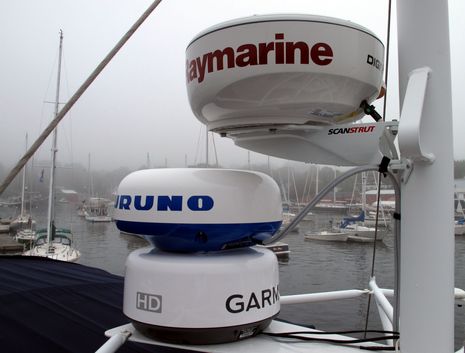 Well, egg #1 below spent three hours taped to the Garmin 18 HD dome, #2 is straight from the box, and #3 spent its three hours on the BR24 dome. There were no perceivable differences in their condition, and this was probably a completely meaningless test. But I can tell that ninety seconds in Gizmo’s microwave cooked all three to a tasty state. Have a great weekend.
Well, egg #1 below spent three hours taped to the Garmin 18 HD dome, #2 is straight from the box, and #3 spent its three hours on the BR24 dome. There were no perceivable differences in their condition, and this was probably a completely meaningless test. But I can tell that ninety seconds in Gizmo’s microwave cooked all three to a tasty state. Have a great weekend.


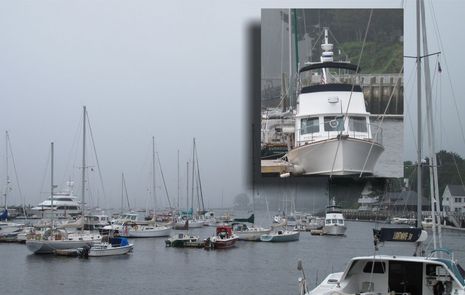
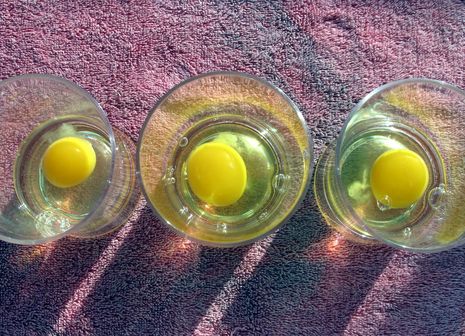
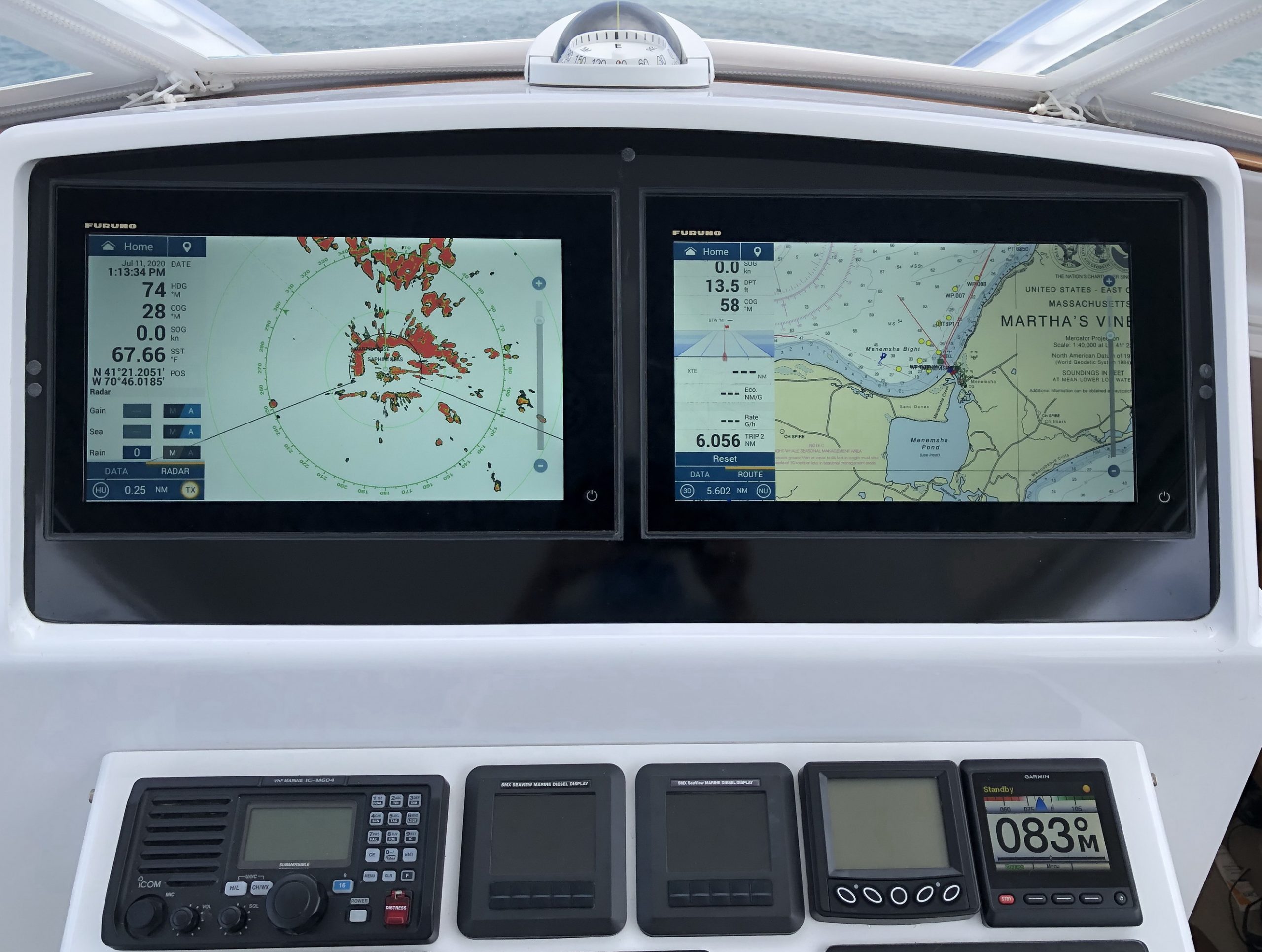
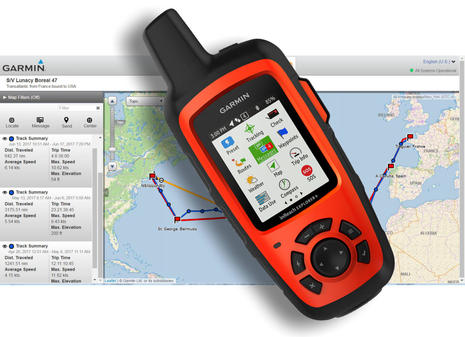
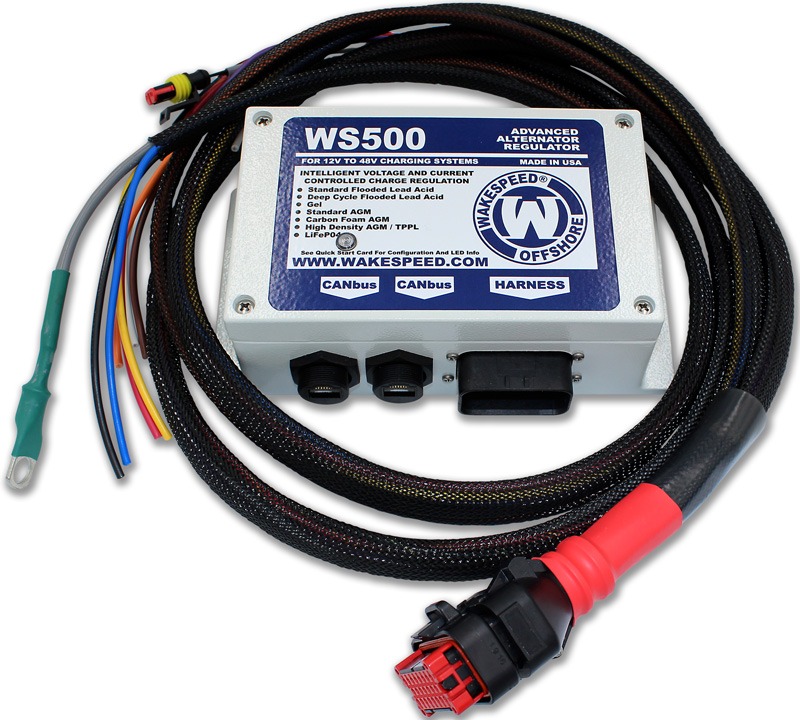
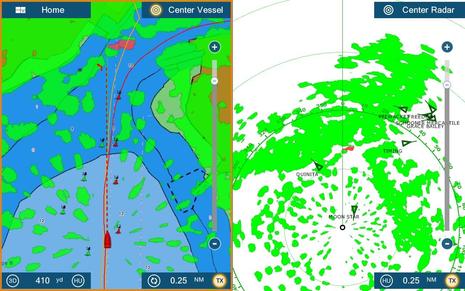







No difference, and the eggs are dissadvantaged compared to our bodies, that have blood circulating continuously to removes heat 100x more than the radars can put out.
Can we all agree that these 4kw radars are 100.0000% safe?
Ben,
Have you tested any radars that will work with a pc rather than a dedicated MFD.
WRT the Egg test – Maggies put out an AVERAGE power of 2 – 4 watts for 2.2 – 4 Kw Transmitters. Your Microwave puts out several hundred watts – take note that your Microwave draws 10 – 15 Amps at 120Vac – thats 1200 Watts+ input power to the oven. No comparison.
You placed the egg in a GLASS container? How much energy got absorbed / reflected by the glass before it got to the egg?? Ever notice how hot a cup or bowl gets in a microwave – thats energy absorbed by the container itself – that did NOT get to the food. So potentially you did not really expose the egg.
4Watts won’t cook an egg – but it can do damage to human Eyes – so beware.
Lastly – power immediately next to the antenna is NOT the peak power – you need to be out side the “near field” of the antenna – where it actually forms a beam. AND the antenna is rotating and illuminating the egg only a fraction of the time – and the egg can cool between passes.
Not a valid test of the concern. Besides – are you really going out and tell everyone they can carry a 2Kw Cell phone next to their heads? Not a true statement – but you get my point.
I agree, DaveV; it was not a valid test. Now if one of the eggs had actually changed texture or color, we’d have something to explore further.
But, Dan, the fact that the eggs didn’t change doesn’t prove that 4 kW radars are %100 safe either. That’s not a rational conclusion.
This is less of a comment then a question posesd to all the more experienced techs on this list. Issue: Our 1996 40� Sail boat was hit by lighting, all electronics wiped out. Question… do we replace the many brands on board with the same or similar or change out to one brand throughout the boat. Currently everything is NMEA 183 not NMEA 2000.
Currently have yr. 2007 – Northstar 8� 6100i GPS , 1997 – Fruno 7� CRT , 1996 – Simrad Robertson Auto Pilot Ap/11 with two heads, 2006 – Icom M502 VHF radio, 2006 – Raymarine ST60s Wind, speed, depth, graphic, multi instruments, 2006 � Digital Cellular amp, Xantrex Freedom 2500 inverter/charger for three 4-D Lifeline house battery bank. 1996 � Nera base satellite phone, Garmin 176 hand held back up gps unit, 1996 � Sony stereo system, Sony CRT 9� color TV, VCR, etc.
Any suggestions or recommendations will be much appreciated. Insurance will cover the loss, as you can see, much if not all the equipment is still fairly current equipment. Do not know if we should change out to stay with one brand such as (Garmin) or (Simrad) or take the best of each and network them as before and go to NMEA 2000 or stay with 183� if NMEA 2000 which size cable Mini or Mirco to power up the above equipment. Go with ultra sonic wind or stay with the old tried and true?
Contact off list at: [email protected]
Thanks
Jeffrey
Robert, I got a demo of a Nobeltec open array radar a few years ago, and it was impressive. But I’m not at all sure that Koden — which supplies all the PC radars, I think — has kept up with radar technology.
Check out the specs here:
http://www.si-tex.com/html/koden_radarpc_p-sea.html
And note that while Koden’s 25″ radome only has 3 pulse lengths, Raymarine’s RD418D has 8. That translates into better range resolution, at least to some degree. But scan line rates, clever software, and dsp chips are at work here too.
It would be wonderful if one or more of the new generation radars became available for independent PC charting software, but I don’t know of any moves in that direction. Even MaxSea TimeZero and RayTech, which can display Furuno or Raymarine radar, don’t seem to be getting much attention from their developers.
Hi Ben,
I have a customer who has MaxSea TZ Explorer as part of his NN3D setup.
In theory as MaxSea communicates with the antenna and not through navnet you could run a DRS radome into MaxSea TZ Explorer.
You would just need a 48v PSU for the antenna.
Andy
Thanks, Andy, but I asked Furuno about this last year and they said it was not possible to run radar on MaxSea TZ without an MFD in the system:
https://panbo.com/archives/2008/05/nn3d_shipping_facts_the_time_zero_connection.html
Did I misunderstand?
Also, I presume your customer is outside the U.S. as TZ is not available here yet.
Hi Ben,
Yes customer is in the UK.
Due to cabling issues we ran his scanner from a 24v to 48v psu to save running a cable the entire length of the boat from the MFD12.
With the MFD12 switched off we still get a radar image on the PC running MaxSea TZ.
The issue is you cant run the initial setup on the radar, (main bang suppression / heading alignment etc) without an MFD.
Andy
If the egg had been discolored, I would still argue that the test was unfair and radar is safe. An egg dosn’t have the ability to dissapate heat like the human body does 🙂
That the egg came out unscathed, proves nothing either.
But, DaveV, really, right here on Panbo we have material posted in the last 30 days that includes a research intense white paper and a rebuttle that are both very good works! Let’s use that as a base to carry this forward, arguing off that material which
(1) Establishes that we are talking about heat, not the kind of ionizing radiation that causes cancer.
(2) Establishes that we are either over (the white paper) or under (the rebuttle, which accounts for the radar spinning) safety factor which itself is far below the 4 watts of heat that the body can dissipate, and such safety factor accounting for pregnancy, eyes, and so forth.
(3) The SUN provides ultraviolet ionizing radiation that does damage cells and cause cancer. Anytime your not covering your skin to prevent UVA and UVB (come on, that happens to all of us everyday).
Each day if your in the SUN a couple of minutes going to/from your car, you are exposing yourself to a tiny tiny chance of skin cancer.
Each time your in front of your radar, you are exposing yourself to 0.0000% chance of cancer, and an amount of heat your body can easily dissapate.
If you need the links to walk back to the earlier blogs I would be happy to post them.
Ben,
I have complained to Garmin about their new HD Radar performance and the Furuno product guy even told me that when they ran the Garmin Radar in their test chamber, the horizontal beam width wasn’t even close to the number that Garmin was listing. He also told me that there is no magic beamwidth reducers and horizontal beam width is purely a function of the length of the array.
Your unbiased observations confirms Furuno’s claims and proves that Garmin is indeed lying about the true specifications of their radar products.
It seems like Raymarine is doing the same thing on their new digital domes as well.
I am going to tell all of my knowledgeable customers that they can no longer use the horizontal beamwidth specification as a measure of radar performance. They come in asking questions and are fed a line of crap by the ex-burger flipping kids at West Marine.
Also, all of this crap about radar danger is BS if the radar is simply mounted above the operators and they are not in the vertical beam as is the case on 99% of all boats.
Ben, thank you for mentioning Koden and Nobeltec, we are big fans of yours here at Koden America. We are happy to report that our 12 and 25 kW scanners have been certified under the new IMO performance standards which specifically deal with target detection, range and bearing accuracy, and most of our radar models are all new for 2008-2009. There are areas other than short range detection where we drive the technology, not merely keep up with it. Koden radars, in our humble biased opinion, are as good or better than anything else out there.
We make a great 18″ dome unit, the Koden MDC-921 which you reviewed earlier, but which we would love to send up to you for live testing. Or since you already have the Coastal Explorer installed, check out their terrific radar implementation with Koden’s 25″ dome.
Gleb Tchaikovski
Vice President of Sales
Koden America Inc.
Ben, the issue with the Furuno that may have caused confusion is that the smaller units can draw power directly from an MFD, if there is no MFD they need a separate PSU as Andy has in the configuration he described. Power and setup issues aside, MaxSea communicates directly with the antenna over NavNet (aka Ethernet).
“Electronics Dealer,” I think you may be confused about what I meant, and maybe what the Furuno guy meant. All four domes I’m testing claim very similar beam widths — like 4.9 to 5.2 degrees — and I believe they are all correct. But the resolution they’re getting from that beam width varies some, and is all better than what I’ve seen on earlier 18″ radomes.
Sheesh…now I’m told by someone who probably knows that Garmin measures its beam width using a different standard than the other manufacturers (who use “3dB points”), and hence is claiming narrower beams that would not hold up to an apples-to-apples comparison.
The evidence mounts that you have to see a radar in action to know how it will perform. And, given that much of the ultimate display is created by software that can be improved, even real world testing may not be the final word.
Ben-
It’s kind of like the way Lowrance has always used peak to peak measurement for their sounders instead of RMS like the rest of the world.
Radar is non-ionizing HF microwave radiation. Long as you don’t grab the emitter and paste your head to it, you should be fine as were the eggs.